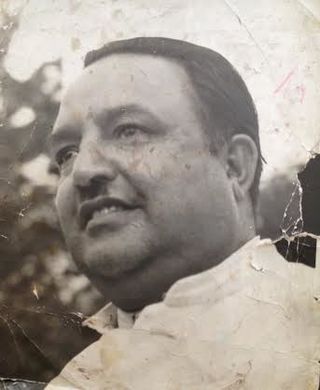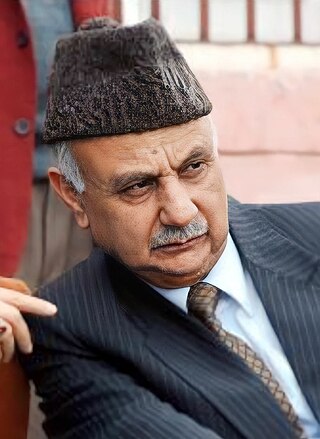
The Jammu and Kashmir National Conference (JKNC) is a regional political party in Indian-administered Kashmir's union territories of Jammu and Kashmir and Ladakh. Founded as the All Jammu and Kashmir Muslim Conference by Sheikh Abdullah and Chaudhry Ghulam Abbas in 1932 in the princely state of Jammu and Kashmir, the organisation renamed itself to National Conference in 1939 in order to represent all the people of the state. It supported the accession of the princely state to India in 1947. Prior to that, in 1941, a group led by Ghulam Abbas broke off from the National Conference and revived the old Muslim Conference. The revived Muslim Conference supported the accession of the princely state to Pakistan and led the movement for Azad Kashmir.

Mufti Mohammad Sayeed was an Indian politician who served twice as the Chief Minister of Jammu and Kashmir from November 2002–November 2005 and March 2015–January 2016. He was also Minister of Tourism in Rajiv Gandhi's cabinet and Home Minister of India in V. P. Singh's cabinet. He started in the wing of the National Conference led by G. M. Sadiq, which later merged into the Indian National Congress. He switched to Janata Dal in 1987, eventually founding his own regional party, People's Democratic Party (PDP). The PDP continues to be a political force in Jammu and Kashmir, currently led by his daughter Mehbooba Mufti.

Mehbooba Mufti Sayed is an Indian politician and leader of the Jammu and Kashmir People's Democratic Party (PDP), who served as the 9th Chief Minister of Jammu and Kashmir from 4 April 2016 to 19 June 2018. She was the first female chief minister of Jammu and Kashmir. After the revocation of Article 370 of the constitution in August 2019, Mufti was detained without any charges at first and later under the Jammu and Kashmir Public Safety Act.
Khwaja Mubarak Shah was a senior Jammu & Kashmir National Conference leader and former Member of The Indian Parliament (MP) from the North Kashmir constituency of Baramulla in the early 1980s and also served as a Deputy Minister in the 1952 Government of Prime Minister Sheikh Mohammad Abdullah. He also served as Superintendent of Police from 1947 for a brief spell and was trained under Gen. Thimaih, and had given up the job to join politics after Sheikh Mohammed Abdullah was made as an interim Administrator to govern the State when its Dogra ruler Maharaja Hari Singh was dethroned in 1947. He was jailed along with Sheikh Mohammad Abdullah and remained in Jail from August 1953 to February 1963, when his father had died. Mubarak Shah polled an overwhelming 67.57% of votes in the Parliamentary Elections in 1980 as opposed to his closest opponent, Muzaffar Hussain Beg who polled 28.48% of total votes polled. He is the son of Khwaja Sikander Shah of Varmul and the Brother-in-Law of Ghulam Ahmad Ashai. He was succeeded as the MP from Baramulla by Saifuddin Soz, who went on to serve as the Union Minister for Water Resources in the first Manmohan Singh Administration.

Mirza Afzal Beg, also known as Fakhr-e-Kashmir was a Kashmiri politician and the founding member of Jammu & Kashmir National Conference. He was the first Deputy Chief Minister of Jammu and Kashmir. He was member of the Constituent Assembly of India. He served as a minister in the pre-independence period in the princely state of Jammu and Kashmir, and as the revenue minister in the post-independence government headed by Sheikh Abdullah. In this post he led the land reforms in Jammu and Kashmir, recognised as the most successful land reforms in India.

The Jammu and Kashmir Legislative Assembly, also known as the Jammu and Kashmir Vidhan Sabha is the legislature of Indian union territory of Jammu and Kashmir.

Mirza Mehboob Beg is a veteran Indian politician from Jammu and Kashmir, belonging to the Peoples' Democratic Party (PDP) and currently serving as its General Secretary(Organisation). Beg has been elected to the Jammu and Kashmir Legislative Assembly, Legislative Council and the Indian Parliament various times. He has also served as the Cabinet Minister for Health, Family Welfare and Medical Education.

Elections in the Union Territory of Jammu and Kashmir are conducted in accordance with the Constitution of India to elect the representatives of various bodies at national, state and district levels including the 114 seat unicameral Jammu and Kashmir Legislative Assembly and the Parliament of India. The first elections in the Union Territory of Jammu and Kashmir took place between 28 November and 19 December 2020 in the form of by-elections to District Development Councils and municipal and panchayat level bodies. A fresh delimitation process for assembly constituencies began in February–March 2020.
Election for the Indian state of Jammu and Kashmir were held on 23 March 1987. Farooq Abdullah was reappointed as the Chief Minister.

Elections for the Indian state of Jammu and Kashmir were held over June 1977, which are generally regarded as the first 'free and fair' elections in the state. Jammu & Kashmir National Conference, newly revived from the former Plebiscite Front, won an overwhelming majority and re-elected Sheikh Abdullah as the Chief Minister.
The first elections for the Legislative Assembly of the Indian state of Jammu and Kashmir under its own Constitution were held in March–June 1957. Bakshi Ghulam Mohammad was appointed Prime Minister of Jammu and Kashmir.
Elections for the Constituent Assembly of the Indian state of Jammu and Kashmir were held in September–October 1951. Sheikh Abdullah was appointed Prime Minister of Jammu and Kashmir. Following frictions with various groups such as the Jammu Praja Parishad agitation, Abdullah was dismissed in August 1953 and imprisoned. Bakshi Ghulam Mohammad was appointed as the next prime minister.
Ranbir Singh Pora–Jammu South Assembly constituency is one of the 90 constituencies in the Jammu and Kashmir Legislative Assembly of Jammu and Kashmir a north state of India. Ranbir Singh Pora is also part of Jammu Lok Sabha constituency.
Chenani Assembly constituency is one of the 90 constituencies in the Jammu and Kashmir Legislative Assembly of Jammu and Kashmir a north state of India. Chenani is also part of Udhampur Lok Sabha constituency.
Reasi is one of the 90 constituencies in the Jammu and Kashmir Legislative Assembly of Jammu and Kashmir a north state of India. It is also part of Udhampur Lok Sabha constituency.
Kargil was a constituency in the Jammu and Kashmir Legislative Assembly of Jammu and Kashmir a north state of India. Kargil is also part of Ladakh Lok Sabha constituency.
Darhal is one of the 87 constituencies in the Jammu and Kashmir Legislative Assembly of Jammu and Kashmir a north state of India. Darhal Malkan is also part of Rajouri anantnag Lok Sabha constituency.
The first election for a legislative assembly called Praja Sabha was held in 1934 in the princely state of Jammu and Kashmir in the British Indian Empire. The Praja Sabha was to have 75 members, of which 12 would be officials, 33 elected members and 30 nominated members. The election was held on 3 September 1934. The All Jammu and Kashmir Muslim Conference under the leadership of Sheikh Abdullah was the largest elected party with 16 seats won. A 'Liberal Group' championed by the Dogra Sadar Sabha had the overall majority in the Assembly with 24 members.

Peer Mohammed Hussain Soharvardi is a Kashmiri politician and former Minister of State in the erstwhile state of Jammu and Kashmir. He served as Member of Legislative Assembly (2002-2008) after being elected from the Shangus assembly constituency. He, subsequently, also served as Vice Chairman of the J&K Muslim Wakf Board.

Peerzada Mohammad Syed is an Indian politician of INC. He won the 2024 Jammu & Kashmir Legislative Assembly election from Anantnag and elected as an MLA. He has been J&K congress President in past









